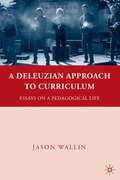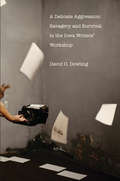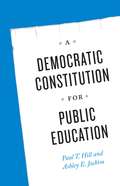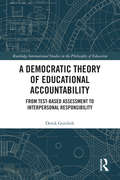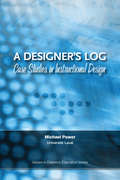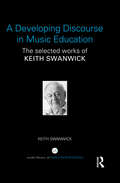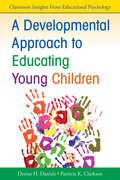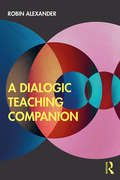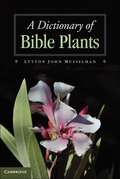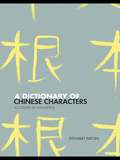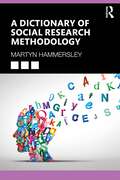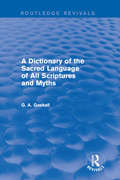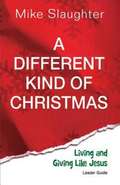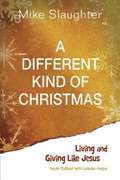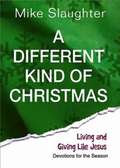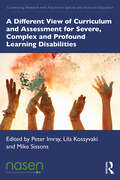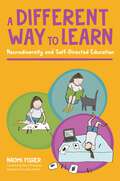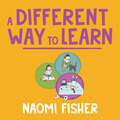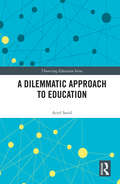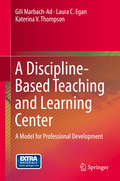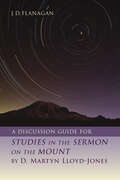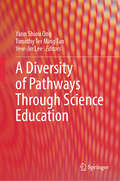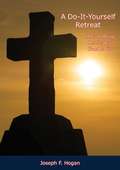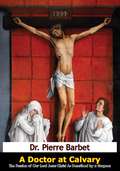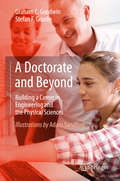- Table View
- List View
A Deleuzian Approach to Curriculum
by Jason J. WallinThis work examines the impoverished image of life presupposed by the legacy of transcendent and representational thinking that continues to frame the limits of curricular thought. Analyzing the ways in which modern institutions colonize desire and overdetermine the life of its subject, this book draws upon the anti-Oedipal philosophy of Gilles Deleuze, revolutionary artistic practice, and an unorthodox curriculum genealogy to rethink the pedagogical project as a task of concept creation for the liberation of life and instantiation of a people yet to come. This book invites academics, artists, and graduate students to engage the contemporary struggles of curriculum theory, educational philosophy, and pedagogical practice with a new set of conceptual tools for thinking radical difference.
A Delicate Aggression: Savagery and Survival in the Iowa Writers' Workshop
by David O. DowlingA vibrant history of the renowned and often controversial Iowa Writers’ Workshop and its celebrated alumni and faculty As the world’s preeminent creative writing program, the Iowa Writers’ Workshop has produced an astonishing number of distinguished writers and poets since its establishment in 1936. Its alumni and faculty include twenty-eight Pulitzer Prize winners, six U.S. poet laureates, and numerous National Book Award winners. This volume follows the program from its rise to prominence in the early 1940s under director Paul Engle, who promoted the “workshop” method of classroom peer criticism. Meant to simulate the rigors of editorial and critical scrutiny in the publishing industry, this educational style created an environment of both competition and community, cooperation and rivalry. Focusing on some of the exceptional authors who have participated in the program—such as Flannery O’Connor, Dylan Thomas, Kurt Vonnegut, Jane Smiley, Sandra Cisneros, T. C. Boyle, and Marilynne Robinson—David Dowling examines how the Iowa Writers’ Workshop has shaped professional authorship, publishing industries, and the course of American literature.
A Democratic Constitution for Public Education
by Paul T. Hill Ashley E. JochimAmerica's education system faces a stark dilemma: it needs governmental oversight, rules and regulations, but it also needs to be adaptable enough to address student needs and the many different problems that can arise at any given school-something that large educational bureaucracies are notoriously bad at. The authors offer a solution.
A Democratic Theory of Educational Accountability: From Test-Based Assessment to Interpersonal Responsibility (Routledge International Studies in the Philosophy of Education)
by Derek GottliebThis insightful text offers a detailed account of the historical development of educational accountability in the US public education system. In doing so, it diagnoses the unforeseen consequences arising from a centralized, technocratic implementation of the concept, and calls for a radical re-thinking in how our democratic responsibilities translate into the provision, measurement, and conceptualization of education. Drawing from the works of scholars including Stanley Cavell, Linda Zerilli, Daniel Koretz, and James Scott, A Democratic Theory of Educational Accountability illustrates the way in which "educational accountability" has foregrounded centralized measures of "success" to the point of perversity. Through nuanced political theory and philosophical arguments, the text demonstrates how test-based measures have rendered the holistic aims of education futile, resulting in an education system of "box-checking" and "rule-following". Ultimately calling for a new imagination of how our democratic responsibilities are enacted in schools and communities, Gottlieb illustrates how accountability can be used for good, to ensure that our schools nurture talent, cultivate social mobility, and engage with local needs. This text will be of great interest to graduate and postgraduate students, researchers, academics, and libraries in the field of philosophy of education, educational policy, assessment & testing and democratic theory.
A Designer's Log: Case Studies in Instructional Design
by Michael PowerBooks and articles on instructional design in online learning abound but rarely do we get such a comprehensive picture of what instructional designers do, how they do it, and the problems they solve as their university changes. Power documents the emergence of an adapted instructional design model for transforming courses from single-mode to dual-mode instruction, making this designer’s log a unique contribution to the field of online learning.
A Developing Discourse in Music Education: The selected works of Keith Swanwick
by Keith SwanwickIn the World Library of Educationalists series, international experts compile career-long collections of what they judge to be their finest pieces – extracts from books, key articles, salient research findings, major theoretical and practical contributions – so the world can read them in a single manageable volume. Readers will be able to follow the themes and strands and see how their work contributes to the development of the field. Since the publication of A Basis for Music Education in 1979, Keith Swanwick has continued to be a major influence on the theory and practice of music education. The international appeal of his insights into the fundamentals of music and music education is recognised in invitations from more than twenty countries to give Key Note presentations, conduct workshops, and advise as a consultant. These include such diverse places as Kazakhstan, Colombia, Iceland and Papua New Guinea. During 1998 he was Visiting Professor, University of Washington. In this collection, Swanwick brings together 12 of his key writings to present an overview of the development of his own work and of the field of music education. The text allows the reader to consider Swanwick’s approach to music education and how it is characterised by a concern for musical, and to some extent wider artistic, processes, shaped by his experience as a teacher and performing musician in a variety of settings, and also by the influences of philosophers, psychologists and sociologists.
A Developmental Approach to Educating Young Children
by Patricia K. Clarkson Denise DanielsLaunch young learners on positive pathways through school! The first in the Classroom Insights From Educational Psychology series, this book gives PreK–3 teachers valuable insight into how current research and theory from educational psychology can be applied to create a child-centered learning environment. Through vignettes, practice exercises, games, and reflection questions, readers gain a deeper understanding of: How children develop from the early years to middle childhood; The importance of fostering positive teacher-child, child-child, and caregiver-child relationships; Developmentally appropriate classroom practices that foster learning; Children’s experiences with technology and outdoor environments.
A Dialogic Teaching Companion
by Robin AlexanderBuilding on Robin Alexander’s landmark Towards Dialogic Teaching, this book shows how and why the dialogic approach has a positive impact on student engagement and learning. It sets out the evidence, examines the underpinning ideas and issues, and offers guidance and resources for the planning, implementation and review of effective dialogic teaching in a wide range of educational settings. Dialogic teaching harnesses the power of talk to engage students’ interest, stimulate their thinking, advance their understanding, expand their ideas and build and evaluate argument, empowering them for lifelong learning and for social and democratic engagement. Drawing on extensive published research as well as the high-profile, 5000-student trial and independent evaluation of Alexander’s distinctive approach to dialogic teaching in action, this book: Presents the case for treating talk as not merely incidental to teaching and learning but as an essential tool of education whose exploitation and development require understanding and skill; Explores questions of definition and conceptualisation in the realms of dialogue, argumentation and dialogic teaching, revealing the similarities and differences between the main approaches; Discusses evidence that has enriched the debate about classroom talk in relation to oracy, argumentation, student voice and philosophy for children as well as dialogic teaching itself; Identifies what it is about dialogic teaching that makes a difference to students’ thinking, learning and understanding; Presents the author’s rationale and framework for dialogic teaching, now completely revised and much expanded; Proposes a professional development strategy for making dialogic teaching happen which, like the framework, has been successfully trialled in schools; Lists resources from others working in the field to support further study and development; Includes an extensive bibliography. Robin Alexander’s A Dialogic Teaching Companion, like its popular predecessor Towards Dialogic Teaching, aims to support the work of all those who are interested in the quality of teaching and learning, but especially trainee and serving teachers, teacher educators, school leaders and researchers.
A Dictionary of Bible Plants
by Lytton John MusselmanThis book describes and illustrates each plant mentioned in both the Old and New Testaments and the Apocrypha. Drawing on Lytton John Musselman's extensive field investigations from Beirut to Borneo and from the Atlas to the Zagros mountains, it also includes his original images of each plant. Incorporating new research on their use, reviews are made of recent analytical studies of plants used in materials and technology as well as ancient grains, beer production, medicine, tensile materials, soap and other articles. Based on these materials, Musselman provides several new plant identifications for controversial biblical passages. In addition, the book surveys the history of Bible plant literature from the time of the Greeks and Romans to the present, and reviews and correlates it with Bible plant hermeneutics. Extensive references for further study are provided, along with an index to all verses containing references to these plants.
A Dictionary of Chinese Characters: Accessed by Phonetics
by Stewart PatonBy arranging frequently used characters under the phonetic element they have in common, rather than only under their radical, the Dictionary encourages the student to link characters according to their phonetic. The system of cross-referencing then allows the student to find easily all the characters in the dictionary which have the same phonetic element, thus helping to fix in the memory the link between a character and its sound and meaning. This innovative resource will be an excellent study-aid for students with a basic grasp of Chinese, whether they are studying with a teacher or learning on their own.
A Dictionary of Social Research Methodology
by Martyn HammersleyThis accessible book offers a detailed guide to a wide range of methodological concepts, both those of a philosophical kind and those that are more technical in character: from constructionism to critical realism, grounded theory to regression analysis, odds ratios to triangulation.It covers quantitative, qualitative, and mixed methods research. There are shorter entries for relatively straightforward terms and longer entries for terms that are more complex or carry more than one meaning. The book includes basic terms – such as data, empirical, fact, meaning, theory, and truth – as well as those that highlight major contemporary trends in the field, such as arts-based research, indigenous methodologies, and decolonisation. It is therefore relevant to many methodological issues and controversies taught in social science degree programmes today.Providing clear definitions for a wide range of methodological concepts from across the social sciences, this is an essential resource for all who have an interest in social research methodology.
A Dictionary of the Sacred Language of All Scriptures and Myths (Routledge Revivals)
by G GaskellG. A. Gaskell’s Dictionary of the Sacred Language of All Scriptures and Myths, first published in 1923, examines several different aspects of religion, including examples from Ancient Egyptian religion and mythology to modern-day Christianity, providing explanations of gods, events, and symbols in alphabetical order. This is a perfect reference book for students of theology or the history of religion.
A Different Kind of Christmas Leader Guide: Living and Giving Like Jesus (A Different Kind of Christmas)
by Mike SlaughterA Different Kind of Christmas is a practical and inspirational study for the Advent season. Based on Mike Slaughter's popular book Christmas Is Not Your Birthday, this five-week study will empower your family and your church to reclaim the broader missional meaning of Jesus' birth and experience a Christmas season with more peace and joy than any toy or gadget could ever bring. This comprehensive resource includes a 64-page Leader Guide containing everything needed to guide your group through the study. Inside you'll find five full session plans, discussion questions, and activities, as well as multiple format options and suggestions of ways to make the study a meaningful experience for any group. Sessions include: 1. Expect a Miracle 2. Giving Up on Perfect 3. Scandalous Love 4. Jesus' Wish List 5. By a Different Road Help your church cast a vision for how Christians can experience the true joy of living and giving like Jesus beginning with the Christmas season and continuing as a lifestyle. This six week study helps participants see the traps and discontentment of consumerism and the call of God to live generously to fulfill God's mission in the world.
A Different Kind of Christmas Youth Study: Living and Giving Like Jesus (A Different Kind of Christmas)
by Michael B. Slaughter Kevin AltonA Different Kind of Christmas is a practical and inspirational study for youth during the Advent season. Based on Mike Slaughter's popular book Christmas is Not Your Birthday, this engaging study will help youth reclaim the broader missional meaning of Jesus' birth and experience a Christmas season with more peace and joy than any toy or gadget could ever bring. This five-week resource for youth includes leader helps. It also provides resources for incorporating A Different Kind of Christmas: Small Group DVD With Leader Guide and for leading a book study of Mike Slaughter's Christmas Is Not Your Birthday.
A Different Kind of Christmas: Devotions for the Season (A Different Kind of Christmas)
by Mike SlaughterEvery year, we say we're going to cut back, simplify, and have a family Christmas that focuses on the real reason for the season--Jesus. But every year, advertisements beckon, the children plead, and it seems easier just to indulge our wants and whims. Overspending, overeating, materialism, and busyness rob us of our peace and joy and rob Jesus of his rightful role as the center of our celebration. This book of devotional readings is designed to draw your entire family into closer fellowship with God as you respond to this Christmas season and the call of God to live generously all year around. The devotional includes thirty short readings, Scripture, prayer, and stories about helping others at Christmas. A Different Kind of Christmas: Devotional Readings for the Season is a great gift idea for family, friends, teachers, and ministry leaders.
A Different View of Curriculum and Assessment for Severe, Complex and Profound Learning Disabilities (Connecting Research with Practice in Special and Inclusive Education)
by Peter Imray Lila Kossyvaki Mike SissonsA Different View of Curriculum and Assessment links a theoretical pedagogical model with a sympathetic practical model of curriculum and assessment difference for those with PMLD, CLD and SLD. Split into two parts, this accessible resource combines theoretical explanations with first-hand accounts of how this works in educational establishments, through the analysis of evidence-based practice carried out in a number of English special (specialist) schools. The expert authors challenge the notion that a national, or common core standards, curriculum, however expertly differentiated, is fit-for-purpose for the PMLD, CLD and SLD populations in any country. A Different View offers cogent and reasoned arguments for considering that irrespective of age, such learners learn differently to their neuro-typical, conventionally developing peers. If they learn differently, this book shows how we should be teaching them differently. Reflecting the centrality of process over product, this book will clearly explain how each individual learner might be enabled and facilitated to become the best they can be and do the best they can do, in order to fully realise their potential as equal and independent citizens.
A Different Way to Learn: Neurodiversity and Self-Directed Education
by Naomi Fisher'If you are a parent worrying whether self-directed education will work for your child, because you have been told that they have special needs which can only be met in the school system - think again'Neurodivergent children experience and interact with the world differently to many of their peers. Standard educational systems often fail to adapt to their unique strengths and ways of learning. School, and even the act of learning, can become a source of great anxiety and trauma. Self-directed education offers an alternative to traditional schools that can help neurodivergent children develop at their own pace and thrive.Blending theory, practical advice and lived experience, clinical psychologist Naomi Fisher introduces the world of self-directed learning and tailoring the learning environment to your child.This comprehensive overview of self-directed learning is packed with ideas on how to implement it at home and includes interviews from parents of neurodivergent children on how you can make learning differently work for you and your child
A Different Way to Learn: Neurodiversity and Self-Directed Education
by Naomi Fisher'If you are a parent worrying whether self-directed education will work for your child, because you have been told that they have special needs which can only be met in the school system - think again'Neurodivergent children experience and interact with the world differently to many of their peers. Standard educational systems often fail to adapt to their unique strengths and ways of learning. School, and even the act of learning, can become a source of great anxiety and trauma. Self-directed education offers an alternative to traditional schools that can help neurodivergent children develop at their own pace and thrive.Blending theory, practical advice and lived experience, clinical psychologist Naomi Fisher introduces the world of self-directed learning and tailoring the learning environment to your child.This comprehensive overview of self-directed learning is packed with ideas on how to implement it at home and includes interviews from parents of neurodivergent children on how you can make learning differently work for you and your child
A Dilemmatic Approach to Education: Exploring A New Model Of Educational Theory (Theorizing Education)
by Ariel SaridA Dilemmatic Approach to Education offers a unique approach to educational theorizing that enriches the way we think about education. Problematizing conventional education theory, it presents an unorthodox thesis that education is defined by an internal conflict between competing core values, which in turn produce core dilemmas. The book locates the theoretical foundations of a dilemmatic approach in the works of thinkers such as G. H. Mead, Gert Biesta, Luca Tateo, and Etienne Wenger. It then relates this dilemmatic approach to a general theory of education, partly defined as the realization of the 'good', conceived in terms of competing core values. The book uses Schwartz's theory of universal values as a framework for disclosing the core values competing in educational models. The dilemmatic nature of educational leadership (including social justice leadership) is set within the context of leading leadership theories and illustrated through exemplary leadership dilemmas. Lastly, the book identifies ethical self-understanding and communities-of-practice as practically affecting a dilemmatic approach to education. Presenting an innovative understanding of the nature and meaning of education, this book will be of great interest to academics, researchers and post-graduate students in the field of educational theory and educational research, as well as those interested in a deep engagement about the meaning of education.
A Discipline-Based Teaching and Learning Center: A Model for Professional Development
by Gili Marbach-Ad Laura C. Egan Katerina V. ThompsonThis book describes the design and implementation of a discipline-specific model of professional development: the disciplinary Teaching and Learning Center (TLC). TLC was born from a strong commitment to improving undergraduate science education through supporting the front-line educators who play an essential role in this mission. The TLC's comprehensive approach encompasses consultation, seminars and workshops, acculturation activities for new faculty members, and teaching preparatory courses as well as a certificate program for graduate students. At the University of Maryland, TLC serves biology and chemistry faculty members, postdoctoral associates, and graduate students. The Center is deeply integrated into the departmental culture, and its emphasis on pedagogical content knowledge makes its activities highly relevant to the community that it serves. The book reflects ten years of intensive work on the design and implementation of the model. Beginning with a needs assessment and continuing with ongoing evaluation, the book presents a wealth of information about how to design and implement effective professional development. In addition, it discusses the theory underlying each of the program components and provides an implementation guide for adopting or adapting the TLC model and its constituent activities at other institutions. In this book, the authors describe how they created the highly successful discipline-based Teaching and Learning Center at the University of Maryland. This is a must read for anyone interested in improving higher education. Charles Henderson, Co-Director, Center for Research on Instructional Change in Postsecondary Education, Western Michigan University This book will provide a much-needed resource for helping campus leaders and faculty development professionals create robust programs that meet the needs of science faculty. Susan Elrod, Dean, College of Science and Mathematics, Fresno State The authors provide a road map and guidance for higher education professional development in the natural science for educators at all levels. While the examples are from the sciences, the approaches are readily adaptable to all disciplines. Spencer A. Benson, Director of the Centre for Teaching and Learning Enhancement, University of Macau
A Discussion Guide for STUDIES IN THE SERMON ON THE MOUNT by D. Martyn Lloyd-Jones
by J.D. FlanaganRediscover a spiritual classic.Since its publication over half a century ago, Studies in the Sermon on the Mount by D. Martyn Lloyd-Jones has inspired generations of Christian readers. Now, J. D. Flanagan revisits Lloyd-Jones&’s classic work of exegesis with this fresh discussion guide.Moving chapter by chapter through Studies in the Sermon on the Mount, Flanagan&’s detailed study guide encourages readers to consider both what the Scripture passage says and how Lloyd-Jones explicates it. Together, Studies and this guide expound on the meaning of Jesus&’s iconic sermon and its implications for the life of faith. Flanagan&’s work encourages readers to apply their reflections to issues that face Christians today.This book includes discussion questions, practical exercises, and scriptural and literary citations.
A Diversity of Pathways Through Science Education
by Yew-Jin Lee Yann Shiou Ong Timothy Ter Ming TanThis book presents the work of academics who contributed their work at the International Science Education Conference (ISEC) 2021, in alignment with the conference theme '20/20 Vision for Science Education Research.' Collectively, the chapters aim to evoke intellectual dialogues on current and future trends in science education. It features chapters that are grouped thematically into three sections: Questions and Questioning in Science/STEM education, Developing Science Teaching and Assessment, and History, Philosophy, and Sociology of Science/Engineering, and Informal Learning. Through the various sections, the book presents empirical studies in science and engineering classrooms or laboratories, puts forward a framework for problem-based learning, provides an account of a prominent scientist’s efforts in promoting practical science through analysis of historical documents, and uncovers trends in informal science learning space research through a review of literature. Each section is introduced by a commentary with further insights and thought-provoking questions on ideas raised in the chapters. The book also includes a 'Notes to Our Future Colleagues' section in each chapter, which presents readers with a collective vision for the state of science education research in the year 2050.
A Do-It-Yourself Retreat: How To Bring Out the Real Good In You
by Joseph HoganThe do-it-yourself appeal which is somewhat popular today is not just a fad. It meets the basic need in man to be creative.This DO-IT-YOURSELF RETREAT makes the same appeal to your highest creative instincts.However, in this case, you are shown not how to make some thing, but HOW TO BRING OUT THE REAL GOOD IN YOU and make yourself into the truly great person that God intended you to be. These pages will help you to discover who you really are, and the discovery will prove to be encouraging and consoling.Although you are doing-it-yourself, this retreat follows a time-tested and approved method. It is progressive. Step by step it helps you to bring out the potential for all the goodness and greatness which is present in you.You are also following a mystery story—these are God’s mysteries—so you do not peek at the chapters ahead. One step at a time is best, and God be with you on the way.This book is for...Those who have never made a retreat, and those to whom the word may sound strange or even forbidding. I think you will like it, and though you start it as an experiment, you may find it so interesting and worthwhile that you will want the fuller and richer experience at a retreat house.Those who would like to make a closed retreat but cannot, especially God’s beloved sick and suffering and those in the evening of life.Those who have made a retreat and who would like to retain the clarity of vision and the peace of soul it gave them.Husbands and wives who would like to make a retreat at home, either together or individually. It can help to oneness in outlook.Finally, but finally only for emphasis, this book is for students who are making an open retreat and want a companion book—collateral reading—to keep them in the spirit of the retreat.
A Doctor at Calvary: The Passion of Our Lord Jesus Christ As Described by a Surgeon
by Dr Pierre Barbet The Earl of Wicklow‘We did not know; nobody has ever told us that!’ These were the words, spoken in tears, of Pope Pius XII on first reading passages from A Doctor at Calvary, Dr. Pierre Barbet’s scientific and reverent study of the Crucifixion of Christ. From an examination of the Holy Shroud of Turin—the authenticity of which Dr. Barbet accepts from medical evidence—a remarkable reconstruction of Christ’s terrible agony is presented in language that cannot fail to move the heart.What kind and what degree of physical torture did Our Lord suffer on Calvary? What was the medical cause of His death? These are among the questions answered in A Doctor at Calvary, one of the most significant contributions to Christological science in modern times. Christ’s preliminary sufferings—the agony in the Garden of Gethsemane, the scourging, the carrying of the cross—the wounds of the hands, in the feet, in the heart, the causes of the rapid death, and the entombment are recounted with the devotion and compassion of an ardent Christian and with a brilliant doctor’s accuracy of anatomical detail.‘Without doubt this is one of the most gripping and moving books to have been published in many a year.’—Harold C. Gardiner, S. J.‘As an aid to vivid viewing of the Passion, this book is peerless.’—Rev. John S. Kennedy, Balancing the Books‘…a profoundly moving study of the Passion.’—Commonwealth‘…a remarkable reconstruction of Christ’s agony and death.’—Jubilee‘This volume is an outstanding example of how science can contribute not only to theology, but to solid Christian piety, and thus be an aid to love of Christ.’—The Voice‘This is a gripping and powerful book of the highest stature.’—Voice of St. Jude‘Sincere study of this book will enable us for the first time to understand what is behind the words: ‘Jesus suffered and died for us.”—America
A Doctorate and Beyond: Building a Career in Engineering and the Physical Sciences
by Graham C. Goodwin Stefan F. GraebeA book that takes you through and beyond your doctoral studies. It will be a valuable reference throughout your working life. Drawing on their own extensive experience, the authors pass on invaluable advice by answering such questions as: Do I want to do a doctorate? How should I choose which doctorate and where to study? How do I achieve my doctorate? What career opportunities exist once I've completed my doctorate? What is the role of networking, leadership and reputation in building my career? How do I go about mentoring the next generation? What do I do when things don't go to plan? This practical guide helps you to determine your best answer to all these questions and more. The authors not only discuss how to become a success but also how to keep success going, beginning with the choice to do a doctorate (or not) and what to expect, through how to get the best from student-supervisor interaction, the value of networking, the process of publication, how to choose between a career in academia or industry, while achieving work-life balance. The authors' own thoughts are enriched by the life experiences of many colleagues and prominent individuals who have achieved success and recognition: the book contains inspirational quotes from established figures in academia and industry. They reflect on career options, what leads to a successful career, and how to make conscious career choices instead of letting things happen and hoping for the best. This ranges from avoiding common pitfalls--such as squandering your reputation--to developing that all-important energy: your personal passion. A Doctorate and Beyond will be an extra difference in making the most of the best times and will support you when the going gets tough. If you are contemplating doctoral studies in engineering or the physical sciences, or have a doctorate and are seeking career guidance, this book will change the way you think about life. For further discussion and information about the book please see the blog/forum hosted by the authors at http://adoctorateandbeyond. com/
